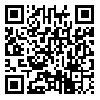Tue, Jan 27, 2026
[Archive]
Volume 10, Issue 1 (Winter 2024)
JCCNC 2024, 10(1): 3-14 |
Back to browse issues page
Download citation:
BibTeX | RIS | EndNote | Medlars | ProCite | Reference Manager | RefWorks
Send citation to:



BibTeX | RIS | EndNote | Medlars | ProCite | Reference Manager | RefWorks
Send citation to:
Azarang Z, Farahaninia M, Bozorgnezhad M, Haghani H. Relationship Between Health Literacy and Addiction Susceptibility in High School Adolescents. JCCNC 2024; 10 (1) :3-14
URL: http://jccnc.iums.ac.ir/article-1-359-en.html
URL: http://jccnc.iums.ac.ir/article-1-359-en.html
1- Department of Community Health Nursing, School of Nursing and Midwifery, Iran University of Medical Sciences, Tehran, Iran.
2- Department of Community Health Nursing, School of Nursing and Midwifery, Iran University of Medical Sciences, Tehran, Iran. ,farahaninia.m@iums.ac.ir
3- Department of Medical-Surgical Nursing, School of Nursing and Midwifery, Iran University of Medical Sciences and Health Services, Tehran, Iran.
4- Department of Biostatistics, School of Public Health, Iran University of Medical Sciences and Health Services, Tehran, Iran.
2- Department of Community Health Nursing, School of Nursing and Midwifery, Iran University of Medical Sciences, Tehran, Iran. ,
3- Department of Medical-Surgical Nursing, School of Nursing and Midwifery, Iran University of Medical Sciences and Health Services, Tehran, Iran.
4- Department of Biostatistics, School of Public Health, Iran University of Medical Sciences and Health Services, Tehran, Iran.
Abstract: (2520 Views)
Background: Adolescence is a high-risk period. Teenagers experience risky behaviors in this period, including using abusive drugs and addiction. Meanwhile, sufficient awareness helps a person to interpret and analyze health-threatening factors. This study aimed to determine the relationship between health literacy and susceptibility to addiction in adolescents living in the western part of Tehran City, Iran.
Methods: This descriptive-correlational study was performed on 265 senior high school students in the western part of Tehran in 2021. The subjects were recruited by cluster random sampling. The study data were collected online using the addiction susceptibility questionnaire and health literacy measure for adolescents. The obtained data were sorted by frequency distribution, Mean±SD and analyzed utilizing the Pearson correlation coefficient, independent t-test, and analysis of variance in SPSS software, version 16. The significance level was set at 0.05.
Results: Most study subjects (56.4%) were female. Their Mean±SD score of health literacy was 65.31±21.15. Among the subscales of health literacy, “calculation”, with a Mean±SD score of 68.96±35.89, and “utilization”, with 61.29±25.05, had the highest and lowest mean scores, respectively. The Mean±SD score of addiction susceptibility was 25.3±30.05, and among its subscales, “showing off” with a mean score of 33.09±32.64 and “family dissatisfaction” with 19.75±35.47 had the highest and lowest mean scores, respectively. Health literacy and its dimensions had a negative correlation with addiction susceptibility (P<0.001).
Conclusion: According to the findings, it is recommended to use appropriate strategies to increase adolescent health literacy by health service providers, school officials, school health nurses, and teachers. The results of this study can be used as a source for further research on addiction and health literacy in adolescents.
Full-Text [PDF 680 kb]
(1207 Downloads)
| | Full-Text (HTML) (597 Views)
• Personal identity is formed during adolescence. Therefore, this group is very vulnerable to substance abuse and risky behaviors.
• Health literacy is one of the factors that gives adolescents a better understanding and shows healthier behaviors in dealing with health-related issues.
• The results of the study showed that although the addiction susceptibility of the adolescents was low, they lacked adequate health literacy.
• Adolescents’ health literacy and addiction susceptibility are associated with their gender, level of interest in learning health-related topics, addiction in the family, mother’s and father’s education and occupation.
• By increasing health literacy and its dimensions in adolescents, their susceptibility to addiction decreases.
• Health literacy is one of the factors that gives adolescents a better understanding and shows healthier behaviors in dealing with health-related issues.
• The results of the study showed that although the addiction susceptibility of the adolescents was low, they lacked adequate health literacy.
• Adolescents’ health literacy and addiction susceptibility are associated with their gender, level of interest in learning health-related topics, addiction in the family, mother’s and father’s education and occupation.
• By increasing health literacy and its dimensions in adolescents, their susceptibility to addiction decreases.
Plain Language Summary
Despite the extensive efforts made worldwide to control drugs, the prevalence of drug use continues to increase. Adolescents experience significant emotional, social, cognitive, and biological changes during their teenage years, which may negatively affect their behavioral choices. This study investigated the relationship between health literacy and susceptibility to addiction in senior high school students. The results showed a significant relationship between health literacy and addiction susceptibility; this means that with the rise in health literacy, the tendency to addiction decreases; also, with increasing interest in learning health-related topics, the susceptibility to addiction decreases.
Type of Study: Research |
Subject:
Special
Received: 2022/02/22 | Accepted: 2022/09/6 | Published: 2024/01/10
Received: 2022/02/22 | Accepted: 2022/09/6 | Published: 2024/01/10
Send email to the article author
| Rights and permissions | |
 |
This work is licensed under a Creative Commons Attribution-NonCommercial 4.0 International License. |






